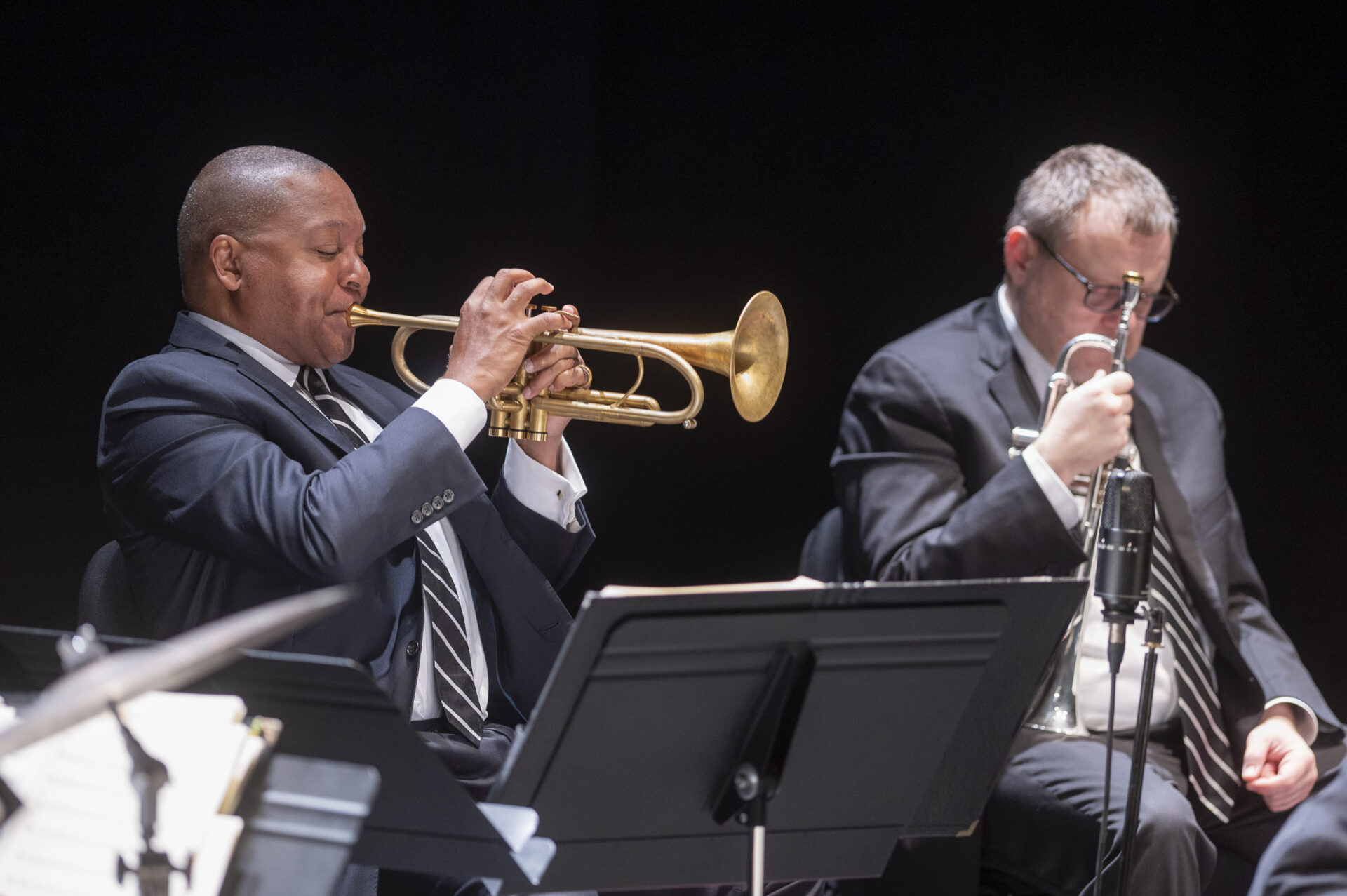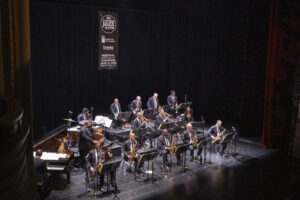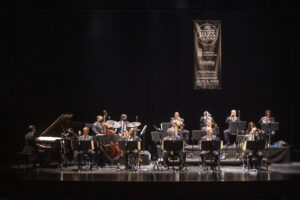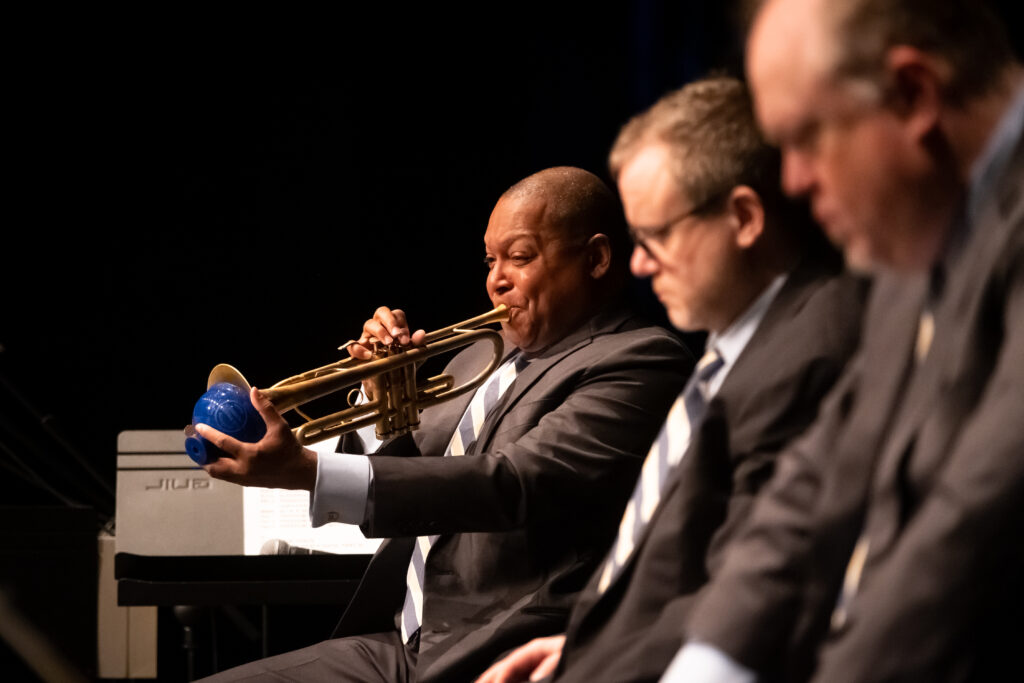Wynton Marsalis & the Jazz at Lincoln Center Orchestra wins over the Canarian audience

- Their two concerts were brilliant and established a landmark in the history of the Festival Internacional Canarias Jazz & Más
- The US Big Band played classic pieces by Count Basie, Duke Ellington, Sonny Rollins, Neal Hefti & Jerry Roll Morton
This weekend the Festival Internacional Canarias Jazz & Más experienced one of the happiest & memorable moments of their 30 editions with two concerts staged by the American ensemble Jazz at Lincoln Center Orchestra (JLCO) with Wynton Marsalis. The two venues had ‘no entrance tickets’ on placards outside the doors and the shows exceeded the expectations of the public, which was already very high before the performances. The repertoire was repeated at both concerts with some exceptions; 75 minutes of swing, jazz & blues that covered the era of the great American big bands of the ‘30s, a legacy which the JLCO and Marsalis himself defend & preserve with zeal and diffuse with elegance and the precision of a Swiss watch, but also with feeling & respect to tradition.
 La JLCO began with a mission statement, clean sounds with no amplifiers or monitors on stage, like old times, only with microphones. And they opened their repertoire with the number Sleepwalker’s Serenade, composed by Neal Hefti, trumpeter & composer of Count Basie’s big band. This piece features in the re-release in 1994 of the album The Atomic Mr. Basie (1958), winner of two prizes in the first edition of the Grammy Awards and considered as one of the Count’s best. A lesson in swing, something which Hefti, who wrote almost all the pieces on the album and also some of the most recognised jazz standards, mastered to perfection. It is said that whoever asks what ‘swing’ is, should listen to this album in particular, and be converted for always. In this first encounter with the audience here, the Jazz at Lincoln Center Orchestra with Wynton Marsalis was able to attain a tremendous impact featuring a sound that identified with the distinguished Count Basie’s big band.
La JLCO began with a mission statement, clean sounds with no amplifiers or monitors on stage, like old times, only with microphones. And they opened their repertoire with the number Sleepwalker’s Serenade, composed by Neal Hefti, trumpeter & composer of Count Basie’s big band. This piece features in the re-release in 1994 of the album The Atomic Mr. Basie (1958), winner of two prizes in the first edition of the Grammy Awards and considered as one of the Count’s best. A lesson in swing, something which Hefti, who wrote almost all the pieces on the album and also some of the most recognised jazz standards, mastered to perfection. It is said that whoever asks what ‘swing’ is, should listen to this album in particular, and be converted for always. In this first encounter with the audience here, the Jazz at Lincoln Center Orchestra with Wynton Marsalis was able to attain a tremendous impact featuring a sound that identified with the distinguished Count Basie’s big band.
The following piece was a gesture to times passing through Spain. The Crave is a composition written & recorded in 1938 by Jelly Roll Morton, who used Spanish rhythms for a style of piano which he referred to as the Spanish Tinge. For this number, the JLCO used the habanera La Paloma with arrangements by bassist Carlos Henríquez, as a reference, but converted to New Orleans’ style.
This was followed by Good Morning Blues with the aura of gloom & sadness that the blues from the Delta have. It is said that the first riffs which later led to rock and roll came from this piece, composed by Count Basie & Eddie Durham, and originally recorded in 1937. This was the only non-instrumental number of the concert, with vocals by trombonist Chris Crenshaw.
Marsalis stayed with the blues, with another gem from the repertoire of Count Basie, Blue and Sentimental co-written by Jerry Livingston & Mack David in 1938 and recorded for the first time by Basie’s orchestra the same year. A piece featuring outstanding performances by saxophonists Sherman Irby & Paul Nedzela.
Halfway through the concert, the important role of Marsalis as director became clear as he managed each member of the band, without too much attention, always alert to the heart of the ensemble situated on his right-hand side, composed of Dan Nimmer (piano), Carlos Henríquez (contrabass) & Obed Calvaire (drums).
 The concert then entered its final stretch, first with a number from the album titled The Fifties: A Prism Movement II, Just A-Slidin’, by trombonist Chris Crenshaw. At the concert in Tenerife, this was substituted for Presidential Suite: Jawaharlal Nehru, by Ted Nash. Later came another classic from the Great American Songbook, where the trumpeters Marsalis himself, Ted Nass, Kenny Rampton & Marcus Printup really shined. We’re talking about Big Fat Alice’s Blues, by the great Duke Ellington & Billy Strayhorn, one of his closest collaborators; a blues piece which took us back to the clubs in New Orleans. After that came another number composed by one of JLCO’s members, 2/3’s Adventure, written by Carlos Henriquez, with clear references to Afro-Cuban music. A new tribute to Duke Ellington, Shout em Aunt Tillie, recorded in 1930, featuring clear swing rhythms, was the prelude to the end, which was delayed following calls for an encore from the audience, and was Freedom Suite: Mvt.5, an original piece by Sonny Rollins, with arrangements by Walter Blanding; an iconic number in the career of the New York saxophonist, a composition which in the original recording lasted around nineteen minutes and in its day was the first musical protest in the times of the start of the Civil Rights Movement. In this case, the JLCO played the fifth movement, which closed this brilliant, intense, emotional and almost perfect concert, laden with nuances.
The concert then entered its final stretch, first with a number from the album titled The Fifties: A Prism Movement II, Just A-Slidin’, by trombonist Chris Crenshaw. At the concert in Tenerife, this was substituted for Presidential Suite: Jawaharlal Nehru, by Ted Nash. Later came another classic from the Great American Songbook, where the trumpeters Marsalis himself, Ted Nass, Kenny Rampton & Marcus Printup really shined. We’re talking about Big Fat Alice’s Blues, by the great Duke Ellington & Billy Strayhorn, one of his closest collaborators; a blues piece which took us back to the clubs in New Orleans. After that came another number composed by one of JLCO’s members, 2/3’s Adventure, written by Carlos Henriquez, with clear references to Afro-Cuban music. A new tribute to Duke Ellington, Shout em Aunt Tillie, recorded in 1930, featuring clear swing rhythms, was the prelude to the end, which was delayed following calls for an encore from the audience, and was Freedom Suite: Mvt.5, an original piece by Sonny Rollins, with arrangements by Walter Blanding; an iconic number in the career of the New York saxophonist, a composition which in the original recording lasted around nineteen minutes and in its day was the first musical protest in the times of the start of the Civil Rights Movement. In this case, the JLCO played the fifth movement, which closed this brilliant, intense, emotional and almost perfect concert, laden with nuances.
The line-up of the JLCO is Wynton Marsalis (musical director & trumpet); Ryan Kisor (trumpet); Kenny Rampton (trumpet); Marcus Printup (trumpet); Chris Crenshaw (trombone); Vincent Gardner (trombone); Elliot Mason (trombone); Walter Blanding (tenor & soprano sax, clarinet); Sherman Irby (alto & soprano sax, flute, clarinet); Ted Nash (alto & soprano sax, flute, clarinet); Victor Goines (tenor & soprano sax, clarinet, bass clarinet); Paul Nedzela (baritone & soprano sax, bass clarinet); Dan Nimmer (piano); & Carlos Henriquez (bass) & Obed Calvaire (drums).
Fotos: Nacho González
